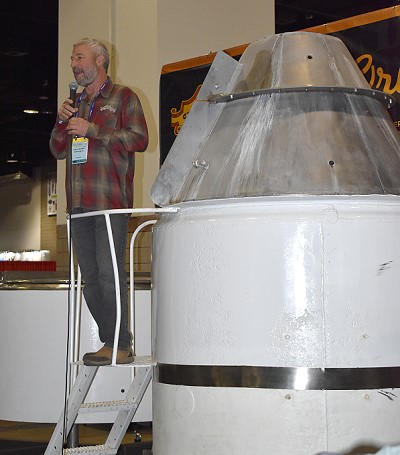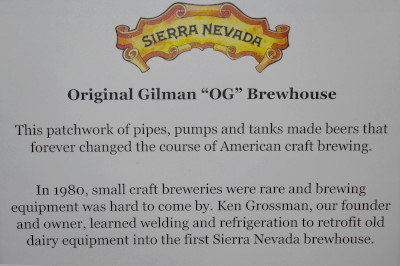The first of the many 120 year-old bottles of Pol Roger Champagne, recovered after a cellar collapse in 1900, were opened in Epernay yesterday…
Via Drinks Business
History
The original “Frankenbrew” system that launched Sierra Nevada on display at GABF
Is it the Apollo 11 Capsule? No! It’s the original “Frankenbrew” system that launched Sierra Nevada!
The original OG brewhouse has been reacquired by Sierra Nevada and is starting its nationwide tour here at GABF.
Come touch a piece of brewing history at GABF.


The History of Beer Is the History of the World
Homer Simpson sez “beer is the cause of, and the solution to, all of life’s problems”. Some scientists claim beer may be the origin of civilization as we know it. The first civilizations emerged along the great river valleys of the then known world: the Tigris and Euphrates, the Ganges and Indus, the Yangtze and Yellow.
Via Outside Magazine
19th-Century Chilean Immigrants Used Icebergs to Chill Their Beer
For Chileans, icebergs are Patagonian icons. Historically, those beautiful chunks of ice, were employed for a very specific purpose: beer refrigeration. Chilean brewers in the mid 1800’s were keen on capturing the icebergs’ chill for the purpose of refrigerating beer.
Via – VinePair
UK – 1,100-Year-Old Viking ‘Beer Hall’ Discovered.
1,100-Year-Old Viking ‘Beer Hall’ Discovered. But It Was Only for the Elites.

Discovered on the island of Rousay, Orkney, in northern Scotland, archaeologists recently unearthed Viking drinking hall. The hall appeared to have been open from the 10th to the 12th centuries, likely served upper class Vikings, according to archaeologists.
Now, all that remains are stones, a handful of artifacts, and very old trash heaps.
Via Live Science
Beers of Joy trailer release – documentary set for March 1 release
Beer documentary from Gravitas Ventures has a March 1 release date — both in theaters and on digital. Check out the trailer below:
The Unbelievable Story of Stephen Foster, Craft Beer Con Man
Since at least 2007, craft breweries in both the U.S.A. and Europe/Africa have apparently been scammed by a man named Stephen Foster, who just so happens to possess the same name as the famous songwriter, although there’s evidence he has at various points worked with the first name “Scott†and the last name “Sala.†He has been connected to a dozen or more breweries, working in various places for a few months at a time (up to several years) before disappearing when things turn sour. He seems to target brewmaster positions especially, but primarily at young breweries with less-than-robust hiring practices where he can win jobs through force of personality alone, covering up a seemingly obvious disqualifier: He’s not very good at making beer.
Via Paste
Yuengling Marks 190th Anniversary With Year-Long Celebration
D.G. Yuengling & Son, Inc., America’s Oldest Brewery®, is celebrating 190 years and six generations of family brewing. In 2019, Yuengling will commemorate its 190th anniversary by offering fans exciting packaging, promotions, special beers, and celebratory events throughout the year.
Since it was founded in 1829, America’s Oldest Brewery has remained fiercely independent, family-owned and continuously operated by the Yuengling family for six generations. Yuengling can now be enjoyed in 22 states with core beer brands: Yuengling® Traditional Lager, Light Lager, Black & Tan, and Golden Pilsner – the first new core product in 17 years and introduced in 2018 by the 6th generation – Jen, Wendy, Debbie and Sheryl Yuengling.
Via: Yuengling
Boak & Bailey – Watney’s Red Barrel – how bad could it have been?
Watney’s (or Watney Mann, or Watney Combe Reid) was the Evil Corporation which sought to crush plucky small brewers and impose its own terrible beer on the drinking public. It acquired and closed beloved local breweries, and it closed pubs, or ruined them with clumsy makeovers.
Its Red Barrel was particularly vile – a symbol of all that was wrong with industrial brewing and national brands pushed through cynical marketing campaigns.
This, at least, was the accepted narrative for a long time, formed by the propaganda of the Campaign for Real Ale in its early years, and set hard through years of repetition.
But does it stand up to scrutiny? What if, contrary to everything we’ve heard, Red Barrel was actually kind of OK?
Via: Boak & Bailey
How a 19th-Century Temperance Advocate Accidentally Created Modern Tourism
In gin-soaked 19th-century Britain, the temperance movement emerged to counteract the myriad social problems stemming from alcohol abuse. Temperance advocates and activists felt an organized effort to limit consumption was the best solution.
Among them was Thomas Cook, a former Baptist preacher and cabinet maker. In 1841, when Cook was 32 years old, he was walking to a local temperance meeting when an idea struck him: Why not use the country’s rapidly expanding rail network to help spread the movement’s views on social reform?
And just like that, Cook inadvertently laid the foundations for modern-day tourism.
Via vinepair.com
Brut IPA: How Ancient Techniques Are Driving the World’s Trendiest Beers
Unless you’ve been living under a beer-repellant rock, you’ve likely heard the word “brut†thrown around the beer world lately. This is mostly due to the recently emerged, rapidly spreading brut IPA category.
But “brut†is not new to brews. Brewers have been experimenting with the sparkling-wine-inspired method for at least a decade. Called bière brut, or bière de Champagne, bottle-conditioned, effervescent beers are are produced in, or inspired by, the méthode Champenoise (Champagne method). The ancient technique is also known as the méthode traditionelle or méthode originale.
via Vinepair
Number of Active U.S. Breweries Surges Past 7,000, For New All-Time High
Craft beer is growing by leaps and bounds. As reported by CraftBeer.com, the number of active breweries in the U.S. surged past 7,000 last month —boosted by small and independent openings— setting a new, all-time high.
The stat, provided by the Brewers Association’s Chief Economist Bart Watson, reveals that as of the end of October, there were 7,082 active breweries in the U.S. That’s an increase of more than 1,100 compared to the same time last year.
Via: VinePair
Weekend Beer TV: Female Brewery Workers (1914-1918)
Link: How Mobile Canning Brought us Closer to Beer
Good Beer Hunting writes on the mobile canning revolution that ushered in the new wave of small breweries canning there releases:
Ever since Oskar Blues’ Dale Katechis dropped his eponymous Pale Ale into aluminum back in 2002, the packaging format has slowly crept into territory owned by bottled 12-oz. six packs and 22-oz. bombers. Even the ubiquitous growler is making way for metal. The development of compact sealers introduced the market to “crowlersâ€â€”a technology developed by can manufacturing giant Ball and pioneered by Oskar Blues, who also acts as the machine’s distributor. Just like with regular-sized cans, the lightweight and recyclable nature of these 32-oz. containers is pushing the popularity of traditional glass flagons to the side.
But something that’s changed dramatically over the past decade or so is the consumer perception surrounding the quality of canned products. Even in the early 21st century, many beer drinkers—especially the early adopters of craft—considered cans to be inferior to bottles. These containers were the hallmark of mass-produced light Lagers, after all. (As it turns out, many craft diehards are coming around to that style as well.) Even folks like Katechis were worried—he admitted in a 2012 interview with CNBC that cans would be perceived as a “gimmick.†Those fears, with time, were ultimately unfounded.
